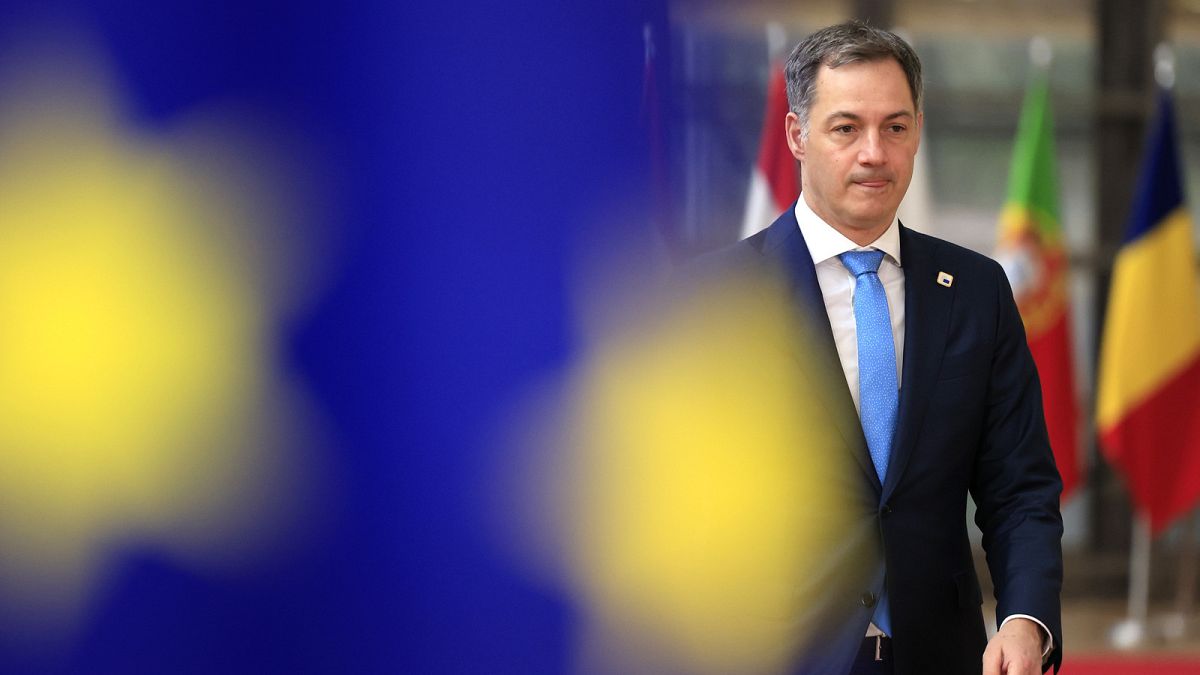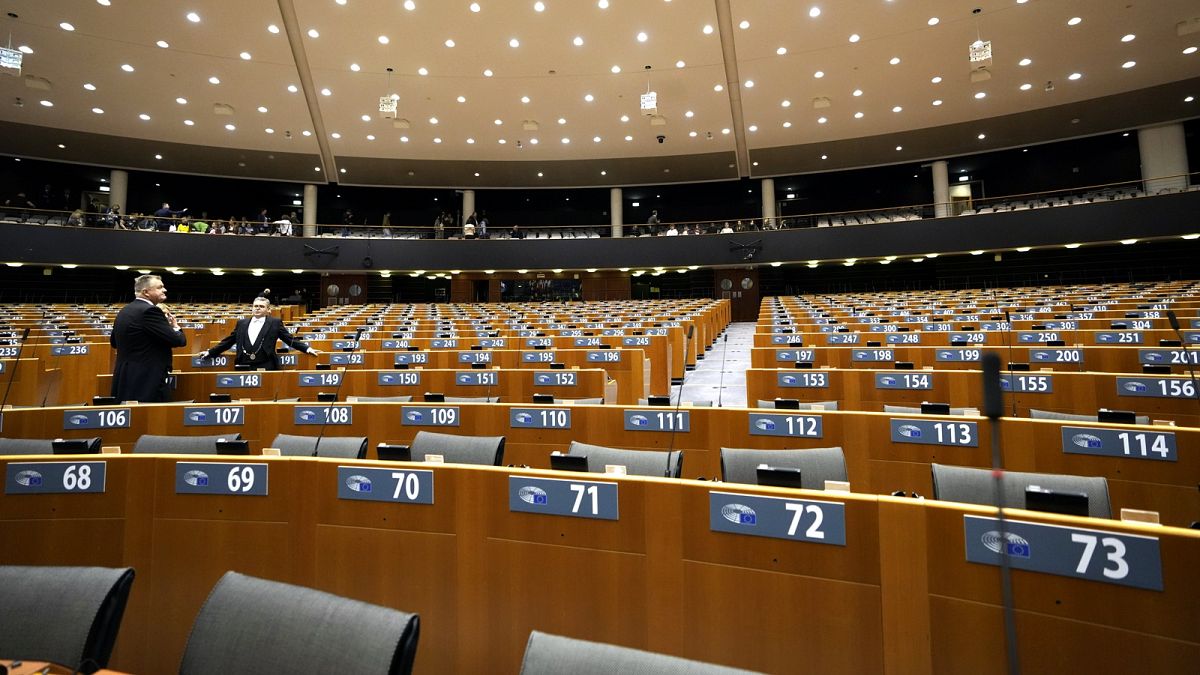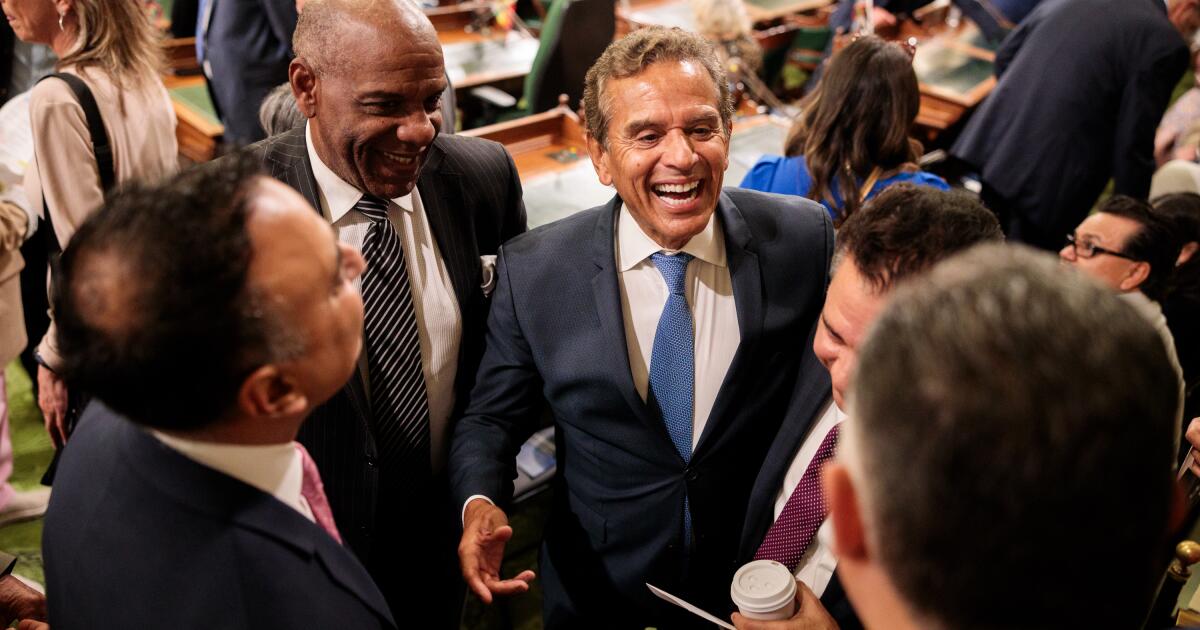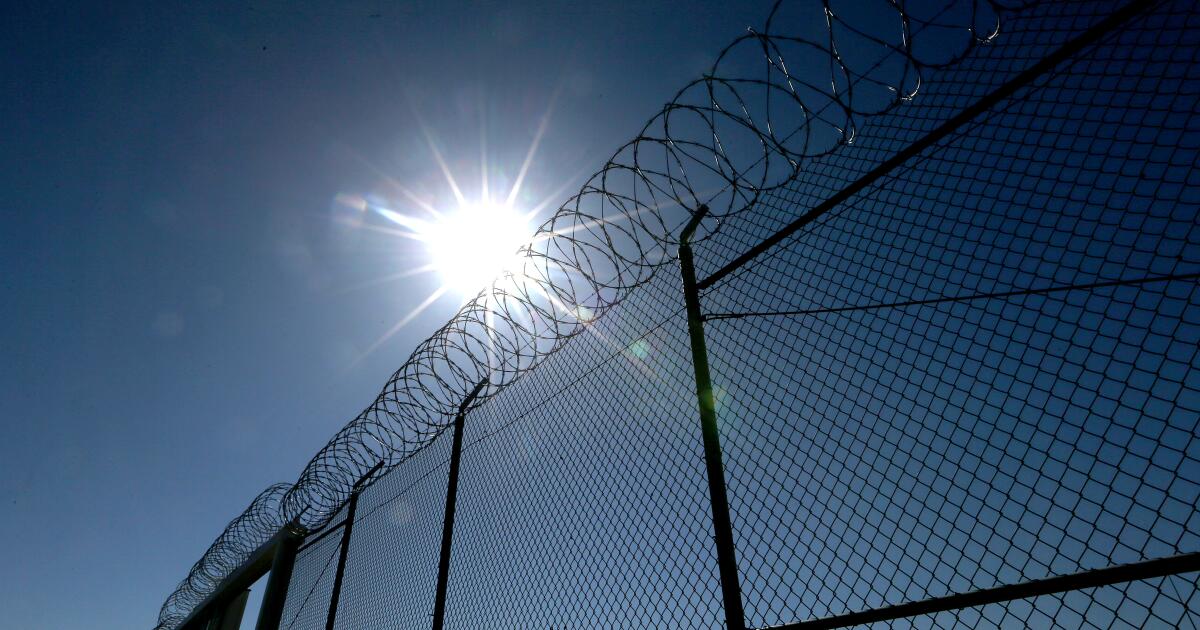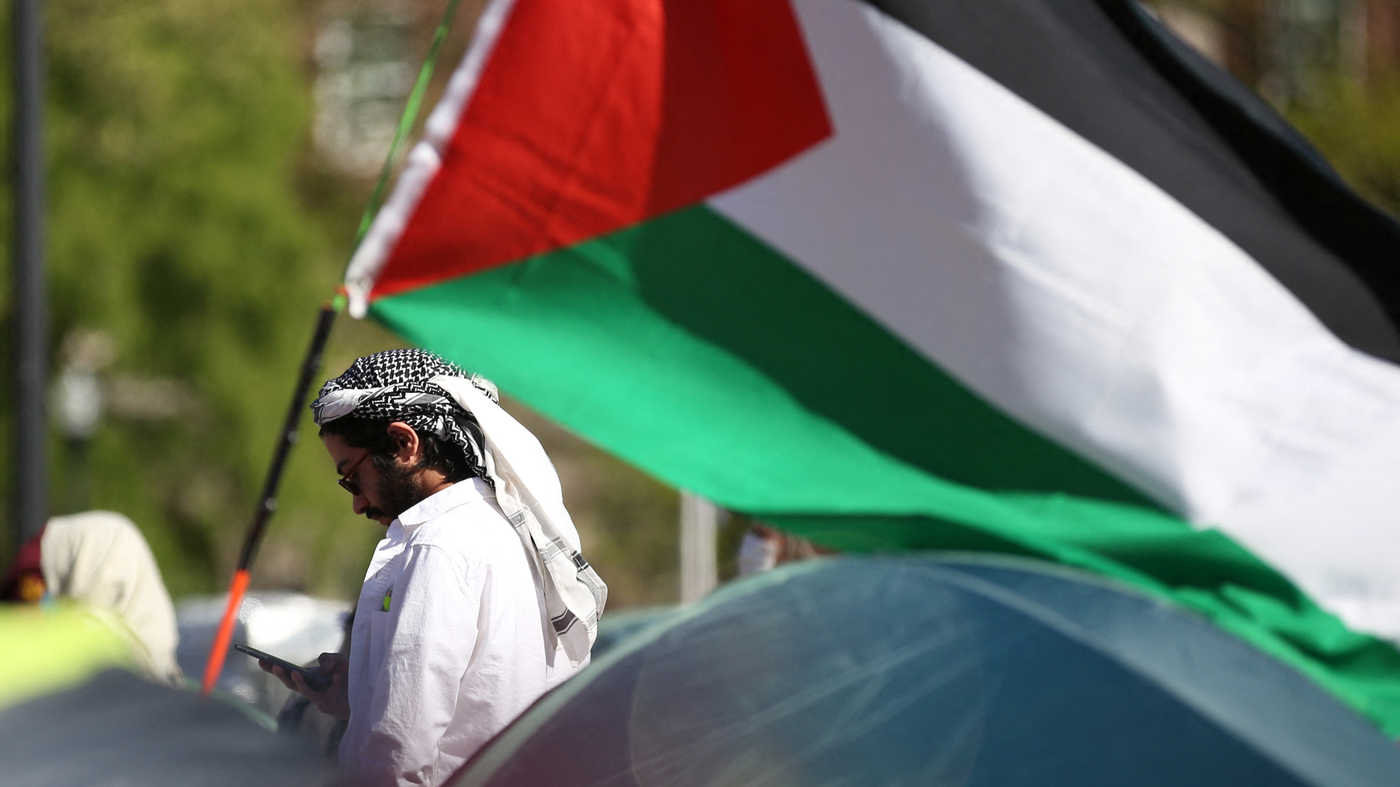World
Navalnaya tells MEPs to 'stop being boring' to defeat Putin's regime
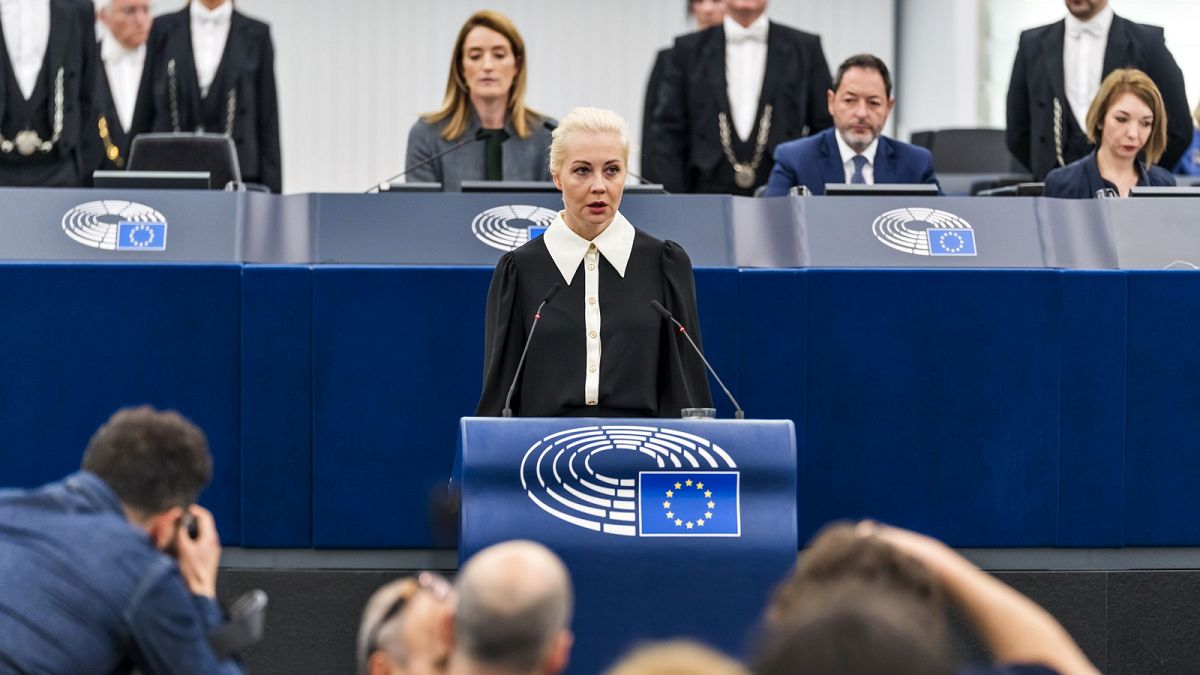
The European Parliament needs to “stop being boring” if it wants to stand up to Vladimir Putin, Yulia Navalnaya told the hemicycle on Wednesday.
“If you really want to defeat Putin, you have to become an innovator. You have to stop being boring,” Navalnaya said in a speech to lawmakers in Strasbourg.
“You cannot hurt Putin with another resolution or another set of sanctions that is no different to the last one,” she added.
“You cannot defeat him by thinking he is a man of principle who has morals and rules. He is not like that. and Alexei realised that a long time ago. You are not dealing with a politician, but with a bloody monster.”
Her speech, interrupted several times by applause, came less than two weeks after her husband Alexei Navalny, considered Putin’s fiercest political foe, died in an Arctic penal colony following years of persecution at the hands of the Kremlin.
The exact circumstances of his passing remain unclear. The EU has directly pinned responsibility for his death on Putin’s regime.
Since Russia’s invasion of Ukraine, the bloc has imposed thirteen packages of sanctions aimed at suffocating Russia’s ability to modernise its economy and cutting access to critical goods used on the battlefield in Ukraine.
High Representative Josep Borrell has vowed to rename the EU’s human rights sanctions regime in Navalny’s honour.
But Navalnaya said the EU needs less symbolism and more targeted investigations focused on Putin’s friends and associates, warning that Putin was continuing to hide money – and power – in EU capitals through organised crime networks.
The Anti-Corruption Foundation, the NGO that Navalny founded, has compiled a list of thousands of Russian officials, oligarchs and propagandists considered Putin’s “bribetakers and warmongers,” many of whom remain spared from Western sanctions.
The widow and activist also pleaded with MEPs not to give in to war fatigue or advocate for peace negotiations with the Russian President.
“There is much exhaustion, much blood, much disappointment, and Putin has gone nowhere,” she explained, adding that the “public murder” of her husband has shown that Putin is “capable of anything” and that “you cannot negotiate with him.”
Russia’s war has had a seismic effect across the continent, sparking a revival of the NATO military alliance and forcing the EU to reignite its dormant enlargement policy to prepare Ukraine’s path to membership,
But scepticism among some political camps about the bloc’s financial and military support to Kyiv, coupled with a faltering Ukrainian counter-offensive, means Brussels is under pressure to do more to show its commitment to Ukraine’s victory.
The prospective return of Donald Trump to the White House means the bloc is gearing up to bolster its defence capacities to back Ukraine without its trans-Atlantic partner.
‘Work with us’
Alexei Navalny was 47 when he died in the Arctic penal colony where he was serving a 19-year sentence on charges of extremism. His death has dealt a blow to pro-democracy Russians, an estimated 400 of whom were detained for laying flowers and lighting candles in his memory in Russian cities.
Associates of Navalny have claimed Putin ordered his assassination just days before a planned prisoner swap, which would have seen him and two US citizens exchanged for Vadim Krasikov, a convicted Russian assassin serving a life sentence in Germany.
The EU, which has long saluted Navalny’s unwavering fight for Russian democracy, repeatedly denounced Putin’s regime for its systemic repression of government critics in the years prior to the invasion of Ukraine.
But the critic’s death has shed light on the futility of those efforts, as Putin has continued to deepen his autocracy.
Navalnaya told the hemicycle that there are “tens of millions” of Russians who oppose the Kremlin but who are unable to express their resistance due to fear.
“We must not persecute them,” she said. “On the contrary, you must work with them, with us.”
Navalnaya has vowed to continue her husband’s crusade and become the new face of Russia’s stifled opposition, galvanising pro-democracy Russians to stand up to the regime.
“Putin must answer for what he has done to a neighbouring peaceful country, and Putin must answer for everything he has done to Alexei. My husband will never see what the beautiful Russia of the future will look like. But we must see it, and I will do,” she told the Parliament.
“I will do my best to make his (Alexei’s) dream come true. The evil will fall and the beautiful future will come,” she added.
The Parliament’s president, Roberta Metsola, said that the “hope” Alexei represented remains “as bright as ever.”
“The pillars of autocracy always crumble under the weight of its own corruption and people’s desire to live freely,” Metsola said.
Navalnaya confirmed that her husband’s funeral is due to take place in Moscow’s southeast Maryino district on Friday afternoon. She is unsure whether the funeral will be peaceful, or whether Russian police will be present to detain the mourners, she said.

World
‘Divest from Israel’: Decoding the Gaza protest call shaking US campuses
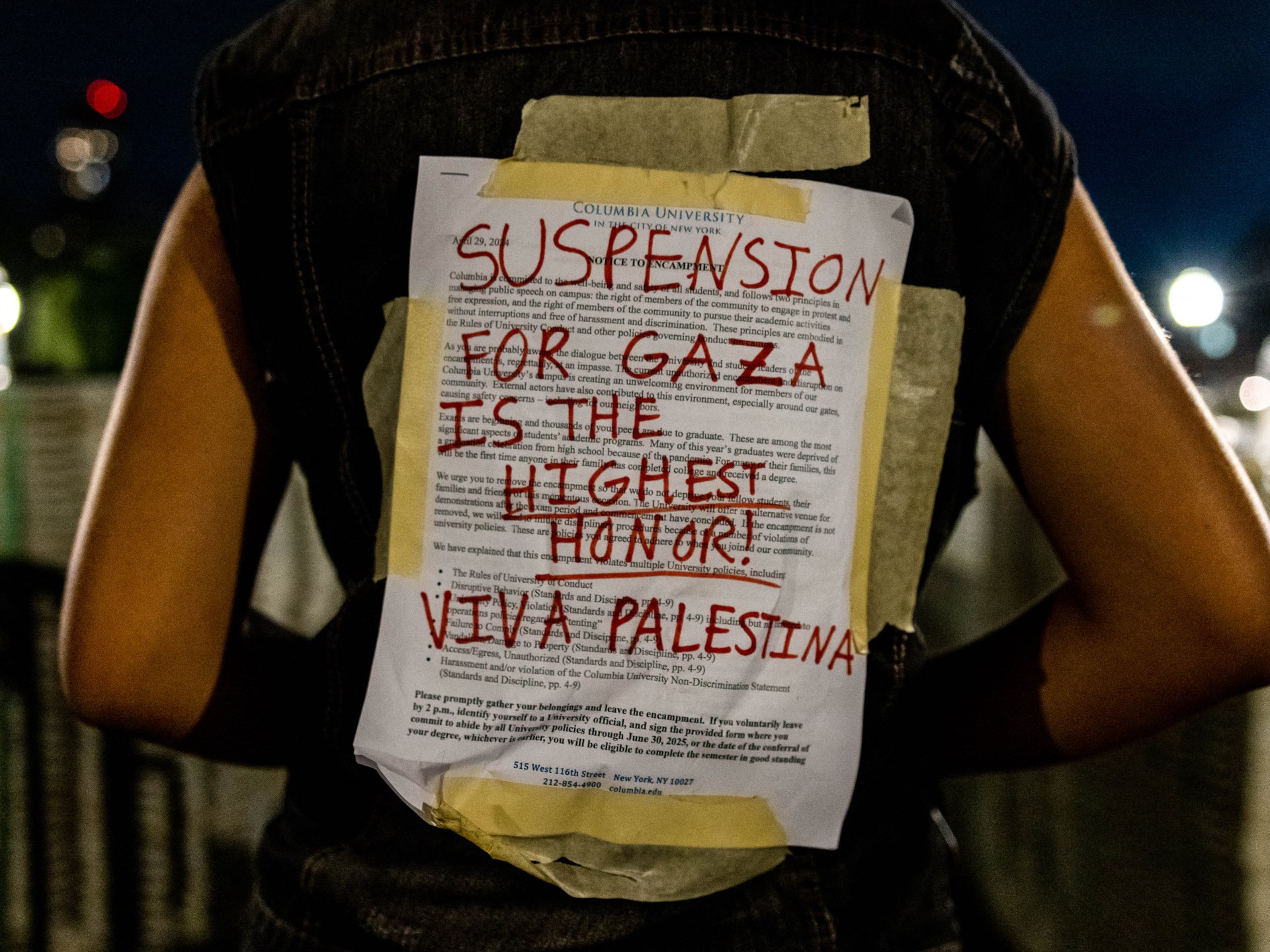
University students are facing threats of arrest or suspension as pro-Palestine protests are burgeoning across campuses in the United States. Students are expressing solidarity with Palestinians in the Gaza Strip, where more than 34,000 people have been killed in Israel’s war of the enclave since October.
Students are calling on their universities to “disclose and divest” their investments in companies and organisations linked to Israel and its war on Gaza.
On Monday, the president of Columbia University, Nemat “Minouche” Shafik, released a statement asserting that Columbia will “not divest from Israel”, prompting protesters to occupy a university building early on Tuesday.
So what exactly is divestment and how do the students want their universities to divest? Here’s more:
What does divestment mean?
Divestment is the process through which an organisation sells off its shares, assets or other investments for political, ethical or financial reasons, according to the Cornell Law School website. In the case of a university, to divest would mean to pull out of investments in certain companies made with money from the university’s endowment fund.
The demand for divestment is not new in the movement against Israel’s occupation of Palestine. In fact, divestment is central to the Boycott, Divestment and Sanctions (BDS) movement, an international effort calling for the boycott of companies accused of being complicit in the occupation of the Palestinian territory, the war on Gaza and violating international law.
What are the students’ divestment demands?
- The protesters at Columbia University, who began building encampments on campus on April 17, are calling for Columbia to divest from corporations that they believe profit from Israel’s war on Gaza.
- Protesters at Columbia passed around a leaflet during admitted students weekend on April 20 and 21 listing the names of some of these corporations – Lockheed Martin, HEICO, BlackRock, Google and Microsoft – Caroline Anne Bissonnette, a journalism student at Columbia who has been covering the protests since they started, told Al Jazeera.
- The New York University (NYU) Alumni for Palestine website calls on NYU to “terminate all vendor contracts with companies playing active roles in the military occupation in Palestine and ongoing genocide in Gaza, namely Cisco, Lockheed Martin, Caterpillar and General Electric”.
- Students at different US universities are calling for greater transparency about their institutions’ investments. A student who is part of the encampments at Tufts University outside Boston told Al Jazeera that one of the “biggest demands of the students” is for the university to disclose its investments.
Why have these companies been named?
The NYU Alumni for Palestine group cited investigations published by the Economic Activism Program of the American Friends Service Committee (AFSC), a Quaker organisation that promotes lasting peace with justice, which names four specific companies.
An investigation of the US-based technology company Cisco revealed that it had established a long-term partnership with Israel in 2018 to develop government-subsidised co-working hubs to help integrate small towns and remote regions to the Israeli high-tech industry. Some of these hubs have been at least partially established in “occupied Palestine and Syria”. Israel’s occupation of the West Bank (Palestine) and the Golan Heights (Syria) is viewed as illegal under international law by most countries.
Maryland-headquartered Lockheed Martin is the world’s largest military company, and an AFSC investigation found that it supplies the Israeli government with weapons. Additionally, the weapons are sometimes “gifted to Israel through the US government’s Foreign Military Financing program”, the investigation found.
Equipment made by US bulldozer manufacturer Caterpillar has also been gifted to Israel through the US financing programme. The Israeli military routinely uses Caterpillar’s D9 bulldozers to demolish Palestinian properties, the AFSC found.
It added that engines and electric power and mechanical systems of the Boston-based General Electric are integrated into the Israeli military’s fighter jets, attack helicopters and surveillance aircraft.
What impact can divestment have?
“Divestment is really hard to do,” Christopher Marsicano, an assistant professor of educational studies at Davidson College in North Carolina who researched the impact of divestment from fossil fuels on university endowments, told Al Jazeera. It is much easier to divest if you have a very small stake in a company, he explained.
He said that while divestment will probably not have much of an economic impact on either university endowments or the Israeli economy, the political impact could be more significant. “Israeli Prime Minister [Benjamin] Netanyahu has already mentioned student protests at American universities publicly. It is clear that these protests have captured the attention of the Israeli government and are putting some pressure on stakeholders to support a ceasefire,” Marsicano said.
How easy is it to divest?
It could in fact be quite difficult for most universities managing large endowment funds to divest from all the companies that do business with Israel and weapons manufacturers. Marsicano explained that university endowment fund managers at most US colleges are “doing what most Americans who have a retirement plan are doing. They’re investing in index funds and private equity.”
Index funds offer investors exposure to all the companies listed on one specific index of shares. A fund tracking the FTSE 100, for example, holds shares in all 100 of the largest companies listed on the London Stock Exchange. Investors in the tracker fund cannot pick and choose which shares to hold. Tracker funds are a popular form of investment for large institutional pension or endowment funds because they provide a good way of diversifying holdings and, therefore, reducing risk.
Furthermore, as companies’ share prices rise and fall, so do their market capitalisations, the value of all of their stocks. That means companies can drop in and out of different indices. It is, therefore, tricky for investors to screen out specific companies.
Can it be economically beneficial to divest?
Not necessarily. The concept of ethical investing – choosing only companies that behave ethically or screening out companies that do not – is no guarantee of good investment returns, Marsicano said. While proponents of divestment say “investing in opportunities that do good in the world will also lead to good investment returns, endowment managers aren’t so sure”, he added.
“What our work showed with fossil fuels [was] that at worst there are negligible effects to the endowment and at best there are positive returns due to divestment. If that world comes, you might see endowment managers make the decision to divest,” Marsicano said.
Will US universities divest from Israel?
Shafik’s statement on Monday indicated that Columbia would not be divesting any part of its $13.64bn endowment fund.
Shafik added, however, that Columbia has offered to develop an “expedited timeline for review of new proposals from the students by the Advisory Committee for Socially Responsible Investing, the body that considers divestment matters”.
Additionally, Shafik said, Columbia is offering more transparency about investments by allowing students to access a list of Columbia’s direct investment holdings, those not held via a tracker or other form of investment fund. Columbia has also offered to update that list more frequently.
However, in a statement posted to X on Monday, Columbia Students for Justice in Palestine claimed the direct investments account for “a mere 6.12 percent of Columbia’s $784m publicly traded investments”. The statement called on Columbia to divest from weapons manufacturers that “profit off the thousands of bombs that have decimated Gaza”.
NYU’s student newspaper, Washington Square News, reported that NYU spokesperson John Beckman said the university is not divesting because it is trying to maximise returns on its endowment to “help the university fulfil its research and educational mission”. Beckman added that NYU’s endowment, valued at $5.9bn, is smaller than that of its peers.
The endowment fund for Northwestern University in Illinois is valued at $14.4bn while Yale University’s endowment is valued at $40.7bn.
Students made efforts to persuade NYU to divest from companies including “GE, Lockheed Martin, Caterpillar and Boeing because they do business with Israel” in 2018, according to a statement released by Beckman in December 2018. “The University opposes this proposal,” the statement read, adding: “It is at odds with the Trustees’ well understood position that the endowment should not be used for making political statements.”
The 2018 statement also said divestment would be an operational challenge because NYU’s endowment assets “are invested through independent financial managers who operate funds in which our assets are co-mingled with others. NYU cannot unilaterally direct those fund managers not to select certain companies’ stock.”
Besides divestment, what do the students want?
Students in the US and abroad are also calling on their institutions to boycott Israeli universities and exchange programmes, to have open dialogue about the war on Gaza, to condemn the killing of Palestinian civilians and to protect students, faculty and staff who are speaking up for Palestine from harassment and censorship.
What’s the latest on the college protests for Gaza?
Columbia issued a deadline on Monday for students to dismantle the encampments of about 120 tents by 2pm (18:00 GMT). They were also asked students to sign a form guaranteeing they would abide by university rules through June 2025. Students who refuse to do this could be suspended pending further investigation.
Columbia Students for Justice in Palestine released a statement on X about four hours before the deadline saying, “Columbia University illegally fabricates a ‘state of emergency’ to mass suspend, expel, and evict hundreds of peaceful protestors by 2 PM today.” The statement added that the protesters had informed the university they were prepared to “escalate their direct actions if Columbia does not adopt basic standards of conduct for negotiations”.
On Tuesday morning after Columbia’s refusal to divest, protesters occupied the university’s Hamilton Hall academic building, in a move reminiscent of the 1968 protests in Columbia against the Vietnam War. They renamed the building Hind’s Hall after Hind Rajab, a six-year-old girl killed in Gaza.
hamilton hall occupied by columbia students, renamed Hind’s Hall in honor of our martyr Hind Rajab. pic.twitter.com/Rwlu9mSwYn
— maryam مريم🇵🇸🍁 (@bluepashminas) April 30, 2024
Another statement released by Columbia Students for Justice in Palestine on X on Tuesday said the protesters intend to occupy the hall until Columbia concedes to the protesters’ demands, including divestment. The statement warned Columbia against bringing armed soldiers or police officers on campus. “Students’ blood will be on your hands,” it said.
PRESS RELEASE by @ColumbiaBDS about the occupation of Hamilton Hall. An autonomous group of students reclaimed the building as “Hind’s Hall” in honor of Hind Rajab, a six year old girl from Gaza. We continue to stand in solidarity with Palestinian Liberation. ❤️🔥 pic.twitter.com/LIm8cScPpD
— Columbia Students for Justice in Palestine (@ColumbiaSJP) April 30, 2024
World
American Idol Remembers Mandisa: Watch Danny Gokey, Melinda Doolittle and Colton Dixon’s Emotional Tribute

ad
World
A Colombian army helicopter has crashed in a rural area of the country's north, killing 9 soldiers
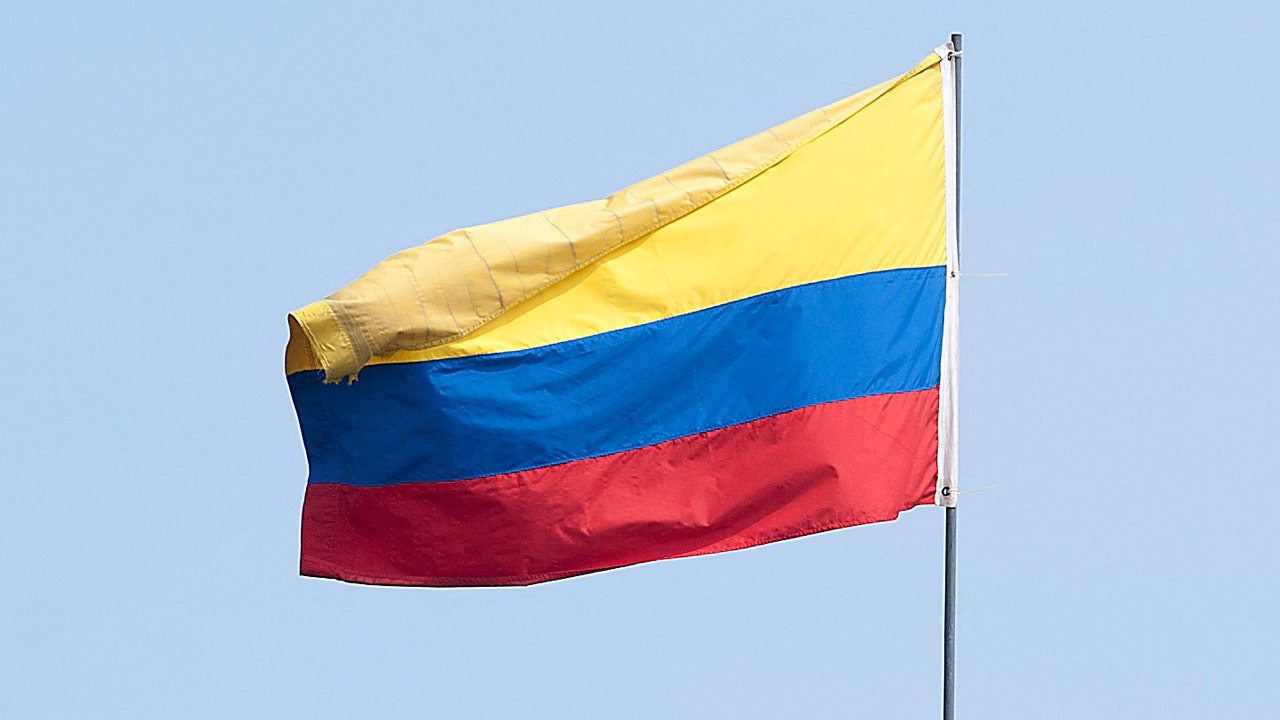
An army helicopter carrying supplies to troops crashed in a rural area in northern Colombia on Monday, killing nine soldiers on board, the country’s armed forces said.
In a statement, the Colombian military said the helicopter was taking the supplies to the municipality of Santa Rosa del Sur, an area that has recently experienced fighting between the National Liberation Army guerrilla group and the drug trafficking group known as the Gulf Clan.
TENS OF THOUSANDS OF COLOMBIANS PROTEST AGAINST LEFTIST PRESIDENT’S AGENDA
The military statement described the helicopter crash as an accident.
Nine members of Colombia’s military lost their lives when their helicopter crashed in a rural area of northern Colombia. (Photo by LUIS ROBAYO/AFP via Getty Images)
“I regret the death of the nine passengers on board the army’s helicopter” Colombian president Gustavo Petro wrote on X on Monday. “It was supplying troops…that were conducting operations against the Gulf Clan.”
The military said the helicopter crashed around 1:50 pm local time. It was an MI-17 Russian-built chopper that is often used to carry troops and supplies.
Two officers were among the victims of the crash, which also included two sergeants and three privates. None of the passengers on the helicopter survived.
-

 World1 week ago
World1 week agoShipping firms plead for UN help amid escalating Middle East conflict
-

 Politics1 week ago
Politics1 week agoICE chief says this foreign adversary isn’t taking back its illegal immigrants
-

 Politics1 week ago
Politics1 week ago'Nothing more backwards' than US funding Ukraine border security but not our own, conservatives say
-

 News1 week ago
News1 week agoThe San Francisco Zoo will receive a pair of pandas from China
-

 World1 week ago
World1 week agoBrussels, my love? The EU single market is not sexy enough for voters
-

 World1 week ago
World1 week agoEU sanctions extremist Israeli settlers over violence in the West Bank
-

 Education1 week ago
Education1 week agoVideo: Dozens of Yale Students Arrested as Campus Protests Spread
-

 Politics1 week ago
Politics1 week agoDemocrats hold major 2024 advantage as House Republicans face further chaos, division




